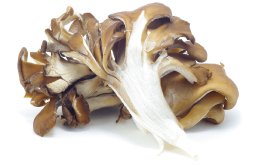GUEST EDITOR

Jun J. Mao, MD, MSCE
Integrative Oncology is guest edited by Jun J. Mao, MD, MSCE, Laurance S. Rockefeller Chair in Integrative Medicine and Chief of Integrative Medicine Service at Memorial Sloan Kettering Cancer Center, New York.

Gary Deng, MD, PhD

Jyothirmai Gubili, MS
The ASCO Post’s Integrative Oncology series is intended to facilitate the availability of evidence-based information on integrative and complementary therapies sometimes used by patients with cancer. In this installment, Gary Deng, MD, PhD, and Jyothirmai Gubili, MS, explore the use of the maitake mushroom (prized for its culinary value) and its extracts by patients with cancer as well as its potentially immunomodulating effects.
Scientific Name: Grifola frondosa
Common Names: King of mushrooms, dancing mushroom, cloud mushroom, hen of woods

Overview
An edible mushroom prevalent in northeastern Japan and China, maitake is an important component of Asian cuisine. Known to grow over a hundred pounds, it is commonly referred to as the “King of the Mushrooms.”
Maitake is valued for promoting health and has been used in traditional medicine for centuries. Its extracts are marketed as dietary supplements, in the form of liquid extracts, tablets, and capsules, to enhance immune function and to treat AIDS and cancer.
The discovery, in the 1980s, that maitake contains more bioactive polysaccharides than other medicinal mushrooms led to increased research efforts. The polysaccharides include alpha and beta glucans, with the D- and further purified MD- fractions exhibiting strong immunomodulating and antitumor effects. Limited clinical data suggest that maitake has immunomodulatory effects and may enhance the effectiveness of chemotherapy.
The Science
Preclinical studies with maitake extracts or polysaccharides have shown hypoglycemic activity,1 reduction in inflammation associated with inflammatory bowel disease,2 stimulated maturation of hematopoietic cells to functionally active myeloid cells, and enhanced recovery of peripheral blood leukocytes following chemotoxic bone marrow injury.3 A maitake extract was also found useful in inducing ovulation in a small study of patients with polycystic ovary syndrome.4
Investigations into potential anticancer effects revealed antitumor property,5 inhibition of tumor metastasis,6 enhancement of bone marrow colony formation and reduction of doxorubicin toxicity,7 and an increase in interferon activity against bladder cancer cells.8
In an exploratory study9 involving 36 patients with advanced cancer (liver, breast, and lung) who discontinued chemotherapy, cancer regression or improvement in symptoms were observed in 23 participants after taking oral tablets containing MD-fraction and whole maitake powder. However, the authors did not report the dosage or duration of the treatment.
The study also presented case series in which maitake combined with chemotherapy potentiated immune function, compared with chemotherapy alone. The daily dosage ranged between 100 mg and 150 mg MD-fraction plus 4 g to 6 g of whole maitake powder, over variable duration.
OF NOTE
Physicians should know that maitake mushrooms can have dual effects on the immune system: stimulation and suppression. They also should be aware that the clinical evidence of its anticancer effects is limited, along with its potential for interactions with warfarin and hypoglycemic medications.
In a dose-escalation trial of 34 postmenopausal patients with breast cancer,10 an oral maitake extract (0.1, 0.5, 1.5, 3, or 5 mg/kg taken twice daily for 3 weeks) was reported to be safe and conferred both immunostimulatory and suppressant effects. A statistically significant association was observed between the dose and immune response (P < .0005), with the strongest effects seen at 3 mg/kg twice daily. The clinical relevance of such effects has yet to be determined.
Furthermore, maitake (3-mg/kg extract given twice daily for 12 weeks) improved neutrophil (P = .005) and monocyte (P = .021) functions, restoring monocyte reactive oxygen species response to physiologic Escherichia coli in a single-arm study of 18 patients with myelodysplastic syndromes (MDS).11 Future trials are needed to determine whether indeed maitake can help reduce bacterial infections in patients with MDS.
Mechanistic studies to date indicate that maitake’s effects are due to activation of macrophages, natural killer cells and T cells, as well as interleukin-1 and superoxide anions.6,12-14 The D-fraction showed antitumor activity by upregulating the expression of a proapoptotic gene, BAK-1,15 prevented breast carcinogenesis, blocked tumor invasiveness, reduced angiogenesis, and increased overall survival in a murine model.16 Additional studies revealed that maitake polysaccharides induced apoptosis in human breast cancer cells via the mitochondrial-dependent apoptotic pathway.17 The antitumor effects of beta glucan GFPBW1 are thought to be exerted via the Dectin-1/Syk/NF-κB signaling pathway.18 Finally, orally administered maitake alpha-glucan activated dendritic cells and macrophages in Peyer’s patches, resulting in induction of systemic antitumor T-cell response.19
Adverse Reactions
Asymptomatic eosinophilia was reported in patients with MDS after consumption of maitake.11
Herb-Drug Interactions
Warfarin: Concomitant use of warfarin may elevate the international normalized ratio.20
Hypoglycemic medications: Maitake may have synergistic effects with hypoglycemic agents.21
Herb-Lab Interactions
Maitake may reduce blood glucose levels.21
Summary
Maitake is a popular, edible mushroom that is prized for its culinary value. Limited clinical studies using maitake extracts show that it can modulate the immune system. However, the clinical meaningfulness of these effects has yet to be determined. Before embarking on the use of maitake extract, patients should consult their physicians to discuss dosage and any potential interactions, especially if they are on hypoglycemic medicines or anticoagulants. ■
Dr. Deng is Medical Director, Attending Physician, and clinical member, Integrative Medicine Service, Memorial Sloan Kettering Cancer Center, New York. Ms. Gubili is Editor, Integrative Medicine Service, Memorial Sloan Kettering Cancer Center, New York.
DISCLOSURE: Dr. Deng and Ms. Gubili reported no conflicts of interest.
REFERENCES
1. Hong L, Xun M, Wutong W: Anti-diabetic effect of an alpha-glucan from fruit body of maitake (Grifola frondosa) on KK-Ay mice. J Pharm Pharmacol 59:575-582, 2007.
2. Lee JS, Park SY, Thapa D, et al: Grifola frondosa water extract alleviates intestinal inflammation by suppressing TNF-alpha production and its signaling. Exp Mol Med 42:143-154, 2010.
3. Lin H, de Stanchina E, Zhou XK, et al: Maitake beta-glucan promotes recovery of leukocytes and myeloid cell function in peripheral blood from paclitaxel hematotoxicity. Cancer Immunol Immunother 59:885-897, 2010.
4. Chen JT, Tominaga K, Sato Y, et al: Maitake mushroom (Grifola frondosa) extract induces ovulation in patients with polycystic ovary syndrome: A possible monotherapy and a combination therapy after failure with first-line clomiphene citrate. J Altern Complement Med 16:1295-1299, 2010.
5. Shomori K, Yamamoto M, Arifuku I, et al: Antitumor effects of a water-soluble extract from Maitake (Grifola frondosa) on human gastric cancer cell lines. Oncol Rep 22:615-620, 2009.
6. Masuda Y, Murata Y, Hayashi M, et al: Inhibitory effect of MD-fraction on tumor metastasis: Involvement of NK cell activation and suppression of intercellular adhesion molecule (ICAM)-1 expression in lung vascular endothelial cells. Biol Pharm Bull 31:1104-1108, 2008.
7. Lin H, She YH, Cassileth BR, et al: Maitake beta-glucan MD-fraction enhances bone marrow colony formation and reduces doxorubicin toxicity in vitro. Int Immunopharmacol 4:91-99, 2004.
8. Louie B, Rajamahanty S, Won J, et al: Synergistic potentiation of interferon activity with maitake mushroom d-fraction on bladder cancer cells. BJU Int 105:1011-1015, 2010.
9. Kodama N, Komuta K, Nanba H: Can Maitake MD-fraction aid cancer patients? Altern Med Rev 7:236-239, 2002.
10. Deng G, Lin H, Seidman A, et al: A phase I/II trial of a polysaccharide extract from Grifola frondosa (Maitake mushroom) in breast cancer patients: Immunological effects. J Cancer Res Clin Oncol 135:1215-1221, 2009.
11. Wesa KM, Cunningham-Rundles S, Klimek VM, et al: Maitake mushroom extract in myelodysplastic syndromes (MDS): A phase II study. Cancer Immunol Immunother 64:237-247, 2015.
12. Adachi K, Nanba H, Kuroda H: Potentiation of host-mediated antitumor activity in mice by beta glucan obtained from Grifola frondosa (maitake). Chem Pharm Bull 35:262-270, 1987.
13. Kubo K, Aoki H, Nanba H: Anti-diabetic activity present in the fruit body of Grifola frondosa (Maitake). Biol Pharm Bull 17:1106-1110, 1994.
14. Horio H, Ohtsuru M: Maitake (Grifola frondosa) improves glucose tolerance of experimental diabetic rats. J Nutr Sci Vitaminol 47:57-63, 2001.
15. Soares R, Meireles M, Rocha A, et al: Maitake (D fraction) mushroom extract induces apoptosis in breast cancer cells by BAK-1 gene activation. J Med Food 14:563-572, 2011.
16. Roldan-Deamicis A, Alonso E, Brie B, et al: Maitake Pro4X has anti-cancer activity and prevents oncogenesis in BALBc mice. Cancer Med 5:2427-2441, 2016.
17. Zhang Y, Sun D, Meng Q, et al: Grifola frondosa polysaccharides induce breast cancer cell apoptosis via the mitochondrial-dependent apoptotic pathway. Int J Mol Med 40:1089-1095, 2017.
18. Fang J, Wang Y, Lv X, et al: Structure of a β-glucan from Grifola frondosa and its antitumor effect by activating Dectin-1/Syk/NF-κB signaling. Glycoconj J 29:365-377, 2012.
19. Masuda Y, Nakayama Y, Tanaka A, et al: Antitumor activity of orally administered maitake α-glucan by stimulating antitumor immune response in murine tumor. PLoS One 12:e0173621, 2017.
20. Hanselin MR, Vande Griend JP, Linnebur SA: INR elevation with maitake extract in combination with warfarin. Ann Pharmacother 44:223-224, 2010.
21. Konno S, Tortorelis DG, Fullerton SA, et al: A possible hypoglycaemic effect of maitake mushroom on type 2 diabetic patients. Diabet Med 18:1010, 2001.

